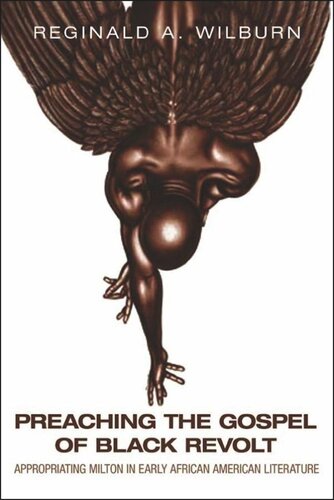

Most ebook files are in PDF format, so you can easily read them using various software such as Foxit Reader or directly on the Google Chrome browser.
Some ebook files are released by publishers in other formats such as .awz, .mobi, .epub, .fb2, etc. You may need to install specific software to read these formats on mobile/PC, such as Calibre.
Please read the tutorial at this link: https://ebookbell.com/faq
We offer FREE conversion to the popular formats you request; however, this may take some time. Therefore, right after payment, please email us, and we will try to provide the service as quickly as possible.
For some exceptional file formats or broken links (if any), please refrain from opening any disputes. Instead, email us first, and we will try to assist within a maximum of 6 hours.
EbookBell Team

4.4
22 reviewsIn this comparative and hybrid study, Reginald A. Wilburn offers the first scholarly work to theorize African American authors’ rebellious appropriations of Milton and his canon. Wilburn engages African Americans’ transatlantic negotiations with perhaps the preeminent freedom writer in the English tradition.
Preaching the Gospel of Black Revolt contends that early African American authors appropriated and remastered Milton by completing and complicating England’s epic poet of liberty with the intertextual originality of repetitive difference. Wilburn focuses on a diverse array of early African American authors, such as Phillis Wheatley, Frances Ellen Watkins Harper, Frederick Douglass, and Anna Julia Cooper. He examines the presence of Milton in their works as a reflection of early African Americans’ rhetorical affiliations with the poet’s satanic epic for messianic purposes of freedom and racial uplift.
Wilburn explains that early African American authors were attracted to Milton because of his preeminent status in literary tradition, strong Christian convictions, and poetic mastery of the English language. This tripartite ministry makes Milton an especially indispensible intertext for authors whose writings and oratory were sometimes presumed beneath the dignity of criticism. Through close readings of canonical and obscure texts, Wilburn explores how various authors rebelled against such assessments of black intellect by altering Milton’s meanings, themes, and figures beyond orthodox interpretations and imbuing them with hermeneutic shades of interpretive and cultural difference. However they remastered Milton, these artists respected his oeuvre as a sacred yet secular talking book of revolt, freedom, and cultural liberation.
Preaching the Gospel of Black Revolt particularly draws upon recent satanic criticism in Milton studies, placing it in dialogue with methodologies germane to African American literary studies. By exposing the subversive workings of an intertextual Middle Passage in black literacy, Wilburn invites scholars from diverse areas of specialization to traverse within and beyond the cultural veils of racial interpretation and along the color line in literary studies.